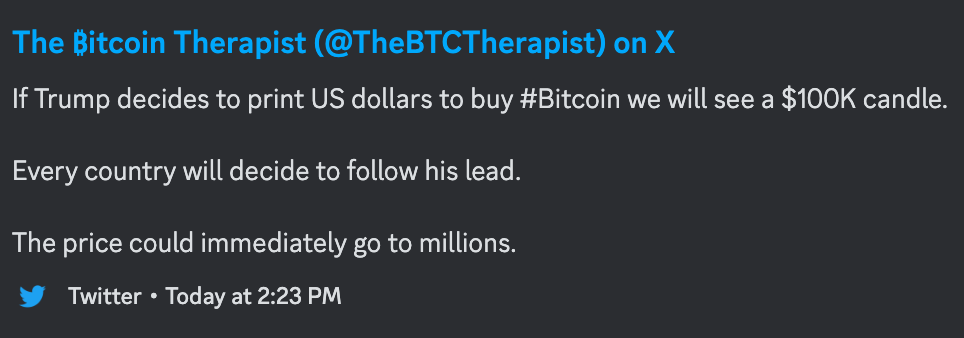Game Theory and Bitcoin: Catalyzing the Next Bull Run
Prepare for what could be something rather special
Bitcoin's role as a strategic reserve asset has become a topic of intense discussion. This narrative is not just about Bitcoin's price potential but also about the intricate dance of game theory, national treasuries, and global economic strategies. As Bitcoin gains traction among corporate treasuries and even national reserves, the implications for the next bull run are profound.
Bitcoin as a Reserve Asset
Michael Saylor, CEO of MicroStrategy, has been a vocal advocate for Bitcoin as a reserve asset. Saylor's company has accumulated a substantial Bitcoin treasury, positioning it as a pioneer in corporate Bitcoin adoption. He argues that Bitcoin, as the world's hardest money, offers a superior hedge against inflation compared to traditional assets like gold or fiat currencies.This perspective is gaining traction, with other companies and even nations considering similar strategies.
Game Theory in Action
Game theory, the study of strategic decision-making, provides a compelling framework for understanding the potential cascade of Bitcoin adoption. The basic premise is that once a significant player adopts Bitcoin, others will be compelled to follow to avoid being left at a strategic disadvantage. This dynamic can be likened to the classic "prisoner's dilemma," where the optimal strategy for each player depends on the actions of others.
Catalysts for Adoption
Several potential catalysts could trigger this game-theoretical cascade:
Corporate Adoption: Companies like MicroStrategy and Tesla have already added Bitcoin to their balance sheets. As more corporations follow suit, the pressure on others to adopt Bitcoin increases, driven by the fear of missing out on potential gains and hedging against inflation.
National Reserves: The idea of Bitcoin as a national reserve asset is gaining momentum. Former President Donald Trump has recently endorsed Bitcoin as a strategic reserve asset, sparking discussions among policymakers about its potential role in national fiscal strategies. If a major economy like the United States were to adopt Bitcoin in this capacity, it could set off a global race among other nations to do the same.
Regulatory Developments: The approval of spot Bitcoin ETFs by the SEC has opened the floodgates for institutional investment. These ETFs provide a regulated and accessible way for investors to gain exposure to Bitcoin, further legitimizing its role as a reserve asset.
Implications of Bitcoin Adoption
The widespread adoption of Bitcoin as a reserve asset could have several profound implications:
Price Surge: If major corporations and nations begin to hold Bitcoin as a reserve asset, the demand for Bitcoin could skyrocket, driving its price to unprecedented levels. Some analysts predict that Bitcoin could reach $110,000 or more in the next cycle, driven by these adoption dynamics.
Economic Stability: Bitcoin's fixed supply and decentralized nature make it an attractive hedge against inflation and currency devaluation. By adopting Bitcoin, entities can protect their reserves from the eroding effects of inflation, potentially leading to greater economic stability.
Geopolitical Shifts: The adoption of Bitcoin by national treasuries could shift the balance of economic power. Countries that adopt Bitcoin early could gain a strategic advantage, much like those that were early adopters of gold in the past. This could lead to a new era of financial diplomacy and competition.
National Reserve Asset. - Some Price Models
The idea of Bitcoin as a national reserve asset is gaining momentum.
Focus on the 112 Multiplier here
More Price Models
Hat Tip to Tom Lee for inspiration
Breaking down the math
Add these together for an EV and you get
0.66 * 187520 = 123,763
0.34 * 70400 = 23,936
Expected Value is $147,699
Money
Remember Money is the Nerve Center. Hence I always say, follow the money!
Conclusion
The intersection of game theory and Bitcoin adoption presents a fascinating scenario for the next bull run. As corporations and nations consider Bitcoin as a reserve asset, the strategic decisions made by these players will have far-reaching implications. The potential for a cascade of adoption, driven by the principles of game theory, could propel Bitcoin to new heights and reshape the global economic landscape.In this dynamic environment, staying informed and understanding the strategic underpinnings of Bitcoin adoption will be crucial for investors and policymakers alike. As we watch this story unfold, one thing is clear: Bitcoin's role in the global economy is poised for a significant transformation.
Bitcoin is peace
















